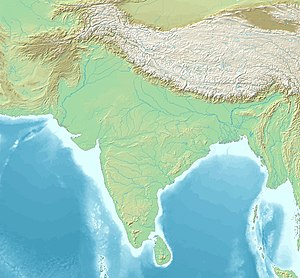
Back Indiese subkontinent Afrikaans Indischer Subkontinent ALS شبه القارة الهندية Arabic شبه القاره الهنديه ARZ ভাৰতীয় উপমহাদেশ Assamese Socontinente indiu AST भारतीय उपमहाद्वीप AWA Hindistan yarımqitəsi Azerbaijani Һинд субконтиненты Bashkir Subkontinenteng Indio BCL
 Geopolitical coverage of the subcontinent | |
| Area | 4,440,000 km2 (1,710,000 sq mi) |
|---|---|
| Population | c. 1.9 billion |
| Countries | |
| Dependencies | |
| Languages | |
| Time zones | List:
|
| Largest cities | |
The Indian subcontinent[note 7] is a physiographical region in Southern Asia, mostly situated on the Indian Plate, projecting southwards into the Indian Ocean from the Himalayas. Geographically, it spans the countries of Bangladesh, Bhutan, the British Indian Ocean Territory (United Kingdom), India,[note 1] Maldives,[note 2] Nepal,[note 3] Pakistan,[note 4] and Sri Lanka.[note 2][1][2][3][4] Although the terms "Indian subcontinent" and "South Asia" are often used interchangeably to denote the region,[5] the geopolitical term of South Asia frequently includes Afghanistan, which is not considered a part of the subcontinent, while excluding the British Indian Ocean Territory which is geologically associated with the subcontinent.[citation needed][6]
Geologically, the subcontinent originates from Insular India, an isolated landmass that rifted from the supercontinent of Gondwana during the Cretaceous and merged with the landmass of Eurasia nearly 55 million years ago, forming the Himalayas.[7] It is one of the most populated regions in the world, holding roughly 20–25 percent of the global population. Geographically, the peninsular region in Southern Asia is located below the Third Pole, delineated by the Himalayas in the north, the Hindu Kush in the west, and the Indo-Burman Ranges in the east.[8] The neighboring geographical regions around the subcontinent include the Tibetan Plateau to the north, the Indochinese Peninsula to the east, the Iranian Plateau to the west, and the Indian Ocean to the south.
Apart from Maritime Southeast Asia (the Malay Archipelago), the maritime region of the subcontinent (littoral South Asia) is the only subregion of Asia that lies partly within the Southern Hemisphere: the British Indian Ocean Territory[citation needed] two of the 26 atolls of the Maldives lie entirely within the Southern Hemisphere.
Cite error: There are <ref group=note> tags on this page, but the references will not show without a {{reflist|group=note}} template (see the help page).
- ^ "Indian subcontinent". New Oxford Dictionary of English (ISBN 0-19-860441-6) New York: Oxford University Press, 2001; p. 929: "the part of Asia south of the Himalayas which forms a peninsula extending into the Indian Ocean, between the Arabian Sea and the Bay of Bengal. Historically forming the whole territory of Greater India, the region is now divided into three countries named Bangladesh, India and Pakistan."
- ^ Cite error: The named reference
dkumar889was invoked but never defined (see the help page). - ^ Cite error: The named reference
pirbhai14was invoked but never defined (see the help page). - ^ Cite error: The named reference
mmannwas invoked but never defined (see the help page). - ^ Cite error: The named reference
McLeod p1was invoked but never defined (see the help page). - ^ Jim Norwine & Alfonso González, The Third World: states of mind and being, pages 209, Taylor & Francis, 1988, ISBN 0-04-910121-8 Quote: ""The term "South Asia" also signifies the Indian Subcontinent""
Raj S. Bhopal, Ethnicity, race, and health in multicultural societies, pages 33, Oxford University Press, 2007, ISBN 0-19-856817-7; Quote: "The term South Asian refers to populations originating from the Indian subcontinent, effectively India, Pakistan, Bangladesh and Sri Lanka;
Lucian W. Pye & Mary W. Pye, Asian Power and Politics, pages 133, Harvard University Press, 1985, ISBN 0-674-04979-9 Quote: "The complex culture of the Indian subcontinent, or South Asia, presents a tradition comparable to Confucianism."
Mark Juergensmeyer, The Oxford handbook of global religions, pages 465, Oxford University Press US, 2006, ISBN 0-19-513798-1
Sugata Bose & Ayesha Jalal, Modern South Asia, page 3, Routledge, 2004, ISBN 0-415-30787-2 - ^ Robert Wynn Jones (2011). Applications of Palaeontology: Techniques and Case Studies. Cambridge University Press. pp. 267–271. ISBN 978-1-139-49920-0.
- ^ Cite error: The named reference
Chapman, Graham P. p. 10was invoked but never defined (see the help page).
